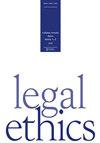Attorney ‘mal-practices’: an invisible ethical problem in the early American republic*
IF 0.3
Q1 LAW
引用次数: 2
Abstract
ABSTRACT Lawyers and judges in the early American republic were surprisingly reluctant to penalise colleagues for malpractice and misconduct towards clients. Though they were part of a legal culture obsessed with preserving lawyers’ moral rectitude, they nonetheless remained sceptical of attempts to address malpractice. This article explores that apparent contradiction. I analyse allegedly wronged clients’ unsuccessful attempts to seek legal satisfaction, whether in civil, criminal, or professional suspension proceedings. I find that the period’s public-spirited legal ethics was in fact a major contributor to these former clients’ difficulties. Legal reformers worried constantly about the dangers to the republic of too-zealous advocacy, which might undermine the public interest. These concerns helped render the opposite problem – of lazy or even duplicitous client ‘advocacy’ – invisible and irremediable. Stories from the past, I argue, help illuminate a tendency to overlook malpractice that continues to this day.律师“不当行为”:美国共和初期一个看不见的伦理问题*
令人惊讶的是,美国早期的律师和法官不愿因同事渎职和对客户的不当行为而惩罚他们。尽管他们是法律文化的一部分,他们痴迷于维护律师的道德正直,但他们仍然对解决渎职行为的尝试持怀疑态度。本文探讨了这种明显的矛盾。我分析了那些被指控受了冤枉的客户在民事、刑事或职业停职诉讼中寻求法律补偿的失败尝试。我发现,那个时期具有公益精神的法律伦理,实际上是造成这些前客户困境的主要原因。法律改革者一直担心,过于热心的倡导可能会损害公共利益,从而给共和国带来危险。这些担忧助长了相反的问题——懒散甚至两面派的客户“辩护”——变得不可见和无法补救。我认为,过去的故事有助于阐明一种忽视医疗事故的倾向,这种倾向一直持续到今天。
本文章由计算机程序翻译,如有差异,请以英文原文为准。
求助全文
约1分钟内获得全文
求助全文

 求助内容:
求助内容: 应助结果提醒方式:
应助结果提醒方式:


